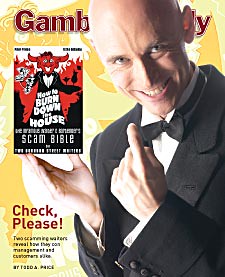Interview w/Peter francis & R.C.DeGlinkta
Q: Isn’t the bottom line that the Scam Bible effectively encourages and even glorifies crime?
DeGlinkta: “Yes, absolutely, but that isn’t unique. Box office hits like Oceans Eleven and Catch Me If You Can do so much more effectively. What really makes this book unique is that it encourages and glorifies petty crime, and that doesn’t sit well with the American public. It hits too close to home. Leonardo Di Caprio can take Pan Am for millions and the crowds go wild, but some poor hard-working waiter hoses down a cheapskate guest for five or ten lousy bucks and he’s the devil himself!”
Q: Your knowledge of restaurant and bar scams is so extensive, it begs the suspicion that the two of you are either very clever or very morally challenged, which is it?
Francis: “Guilty on both counts! Ours is sort of a Robin Hood story in that sense. The Pump Handle waylays the convoy of the evil King, Floordick, and delivers the booty back to the oppressed subjects, in this case himself, the overworked and underpaid food and beverage server. Robin was definitely both clever and morally challenged, as we all are at times.”
Q: Is nothing sacred? Is our beloved dining experience bloated with conspiracy just like everything else?
DeGlinkta: “It is naive for anyone to believe that corruption and subterfuge only exist at a safe distance. The book simply pulls back the curtain to reveal that it is all around us. That sharks and machinations of various shapes and sizes are circling at all times. They don’t always chop your head off like Enron or 9/11; sometimes they just nibble gently at your toenails.”
Q: It has been said, and I quote, “How to Burn Down the House is a purely sophomoric effort devoid of all literary merit, with dubious uses if any.” What is your response to this unfriendly assessment?
Francis: “Well, it definitely isn’t Edgar Allan Poe...but I think he’d like it.”
DeGlinkta: “Yes, absolutely, but that isn’t unique. Box office hits like Oceans Eleven and Catch Me If You Can do so much more effectively. What really makes this book unique is that it encourages and glorifies petty crime, and that doesn’t sit well with the American public. It hits too close to home. Leonardo Di Caprio can take Pan Am for millions and the crowds go wild, but some poor hard-working waiter hoses down a cheapskate guest for five or ten lousy bucks and he’s the devil himself!”
Q: Your knowledge of restaurant and bar scams is so extensive, it begs the suspicion that the two of you are either very clever or very morally challenged, which is it?
Francis: “Guilty on both counts! Ours is sort of a Robin Hood story in that sense. The Pump Handle waylays the convoy of the evil King, Floordick, and delivers the booty back to the oppressed subjects, in this case himself, the overworked and underpaid food and beverage server. Robin was definitely both clever and morally challenged, as we all are at times.”
Q: Is nothing sacred? Is our beloved dining experience bloated with conspiracy just like everything else?
DeGlinkta: “It is naive for anyone to believe that corruption and subterfuge only exist at a safe distance. The book simply pulls back the curtain to reveal that it is all around us. That sharks and machinations of various shapes and sizes are circling at all times. They don’t always chop your head off like Enron or 9/11; sometimes they just nibble gently at your toenails.”
Q: It has been said, and I quote, “How to Burn Down the House is a purely sophomoric effort devoid of all literary merit, with dubious uses if any.” What is your response to this unfriendly assessment?
Francis: “Well, it definitely isn’t Edgar Allan Poe...but I think he’d like it.”



